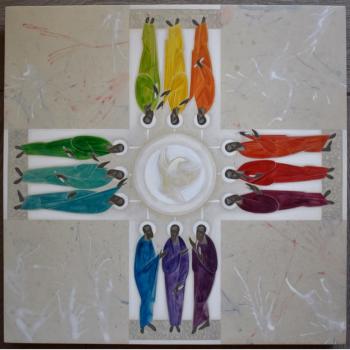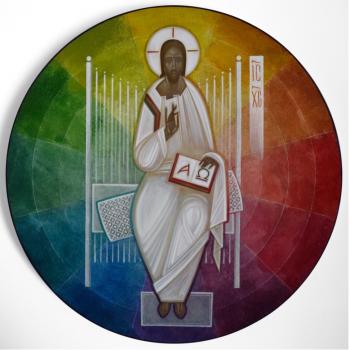This is the first installment of a series on the great hymns of Advent. To learn more about Advent, read my previous post: On Advent: What It Is & Why You Need It.
“O Come, O Come Emmanuel” by Sufjan Stevens from Songs for Christmas (2006)
O come, O come, Emmanuel
And ransom captive Israel
That mourns in lonely exile here
Until the Son of God appearRejoice! Rejoice! Rejoice!
Rejoice! Rejoice! Rejoice!O come, Thou Day-Spring, come and cheer
Our spirits by Thine advent here
Disperse the gloomy clouds of night
And death’s dark shadows put to flight.Rejoice! Rejoice! Rejoice!
Emmanuel
And ransom captive Israel
Rejoice! Rejoice! Rejoice!
Rejoice! Rejoice! Rejoice!O come, O come, Thou Lord of might,
Who to Thy tribes, on Sinai’s height,
In ancient times did’st give the Law,
In cloud, and majesty and awe.Rejoice! Rejoice! Rejoice!
Rejoice! Rejoice! Rejoice!
Rejoice! Rejoice! Rejoice!
Rejoice! Rejoice! Rejoice!
HISTORY OF THE HYMN
This ancient hymn was originally penned in Latin in the 12th century (Veni, Veni Emmanuel). The version most often used today was translated into English in 1851 by John Mason Neale and includes three more verses than Sufjan sings.
The hymn was inspired by the traditional O Antiphons sung at Vespers services during the final seven day stretch of Advent. An antiphon (from the Greek anti + phon meaning opposite + voice) refers to a call and response mode of singing. The seven O Antiphons are comprised of a title for the Messiah from the prophet Isaiah: O Sapienta (Wisdom), O Adonia (Lord), O Radix Jesse (Root of Jesse), O Clavis David (Key of David), O Oriens (Rising Sun, Morning Star, or Day-Spring), O Rex Gentium (King of Nations), and O Emmanuel (God with us).
A fun fact from the O Antiphons is that the titles for the Messiah in reverse order Emmanuel, Rex, Oriens, Clavis, Radix, Adonia, Sapienta form an acrostic ERO CRAS in Latin, which is translated “I will come tomorrow.” Those monks who wrote and arranged the lyrics to the O Antiphons married theological and artistic creativity in a way that puts us to shame.
REFLECTIONS ON THE HYMN
The hymn is inspired by the O Antiphons, which is comprised of titles for the Messiah roughly drawn from the book of Isaiah. These reflections will consider each verse of our hymn in the context of Isaiah.
VERSE ONE: Veni Emmanuel, O Come Emmanuel
This reference to the Messiah is from Isaiah 7:13-15:
And Isaiah said, “Hear then, O house of David! Is it too little for you to weary men, that you weary my God also? Therefore the Lord himself will give you a sign. Behold, the virgin shall conceive and bear a son, and shall call his name Immanuel. He shall eat curds and honey when he knows how to refuse the evil and choose the good.
At this point in the Book of Isaiah, King Ahaz of Judah is facing invasion along the northern border by the alliance of Israel and Syria. King Ahaz’s faith is faltering: rather than trust God to defend God’s people, he trusts in an alliance with Assyria, a foreign and godless nation.
The biblical narrative makes clear that faithlessness and disobedience on the part of God’s people results in exile. This exile first takes place in the garden by God himself and the process repeats itself under the domination of Assyria, Babylon, and eventually the Roman Empire.
This verse reminds us that it is only Emmanuel, God With Us, the Son of God who can rescue and ransom God’s people from exile. To this day, we are still, in a sense, exiles living in a foreign land and so we must continue to sing “O come, O come, Emmanuel.”
VERSE TWO: Veni Oriens, O Come Thou Day-Spring
This reference to the Messiah is from Isaiah 9:2 and especially Isaiah 60:1-2:
The people who walked in darkness have seen a great light; those who dwelt in a land of deep darkness, on them has light shone” (9:2).
Arise, shine, for your light has come, and the glory of the LORD has risen upon you. For behold, darkness shall cover the earth, and thick darkness the peoples; but the LORD will arise upon you, and his glory will be seen upon you (60:1-2).
This verse acknowledges the reality that the world is not as it ought to be: the gloomy clouds of sin and death’s dark shadow create this present darkness that we experience. Our only hope for the lifting of the heavy clouds is for the Son to break the dawn and burn the fog away. To this day, we remain in what C.S. Lewis in The Last Battle calls the Shadowlands. Our only hope in and for this world is the advent of Jesus, who is the Light of the world. So we must continue to sing “O come Thou Day-Spring, come and cheer.”
VERSE THREE: Veni Adonai, O Come Thou Lord of Might
This reference to the Messiah is from Isaiah 11:1-5:
There shall come forth a shoot from the stump of Jesse, and a branch from his roots shall bear fruit. And the Spirit of the LORD shall rest upon him, the Spirit of wisdom and understanding, the Spirit of counsel and might, the Spirit of knowledge and the fear of the LORD. And his delight shall be in the fear of the LORD. He shall not judge by what his eyes see, or decide disputes by what his ears hear, but with righteousness he shall judge the poor, and decide with equity for the meek of the earth; and he shall strike the earth with the rod of his mouth, and with the breath of his lips he shall kill the wicked. Righteousness shall be the belt of his waist, and faithfulness the belt of his loins.
In Isaiah, the people of God are reaping what they’ve sown. They transgressed the law of God and so are experiencing the covenant curse of judgment (Deut 30). Despite their covenant faithlessness, God will have mercy on his people, restore them, and gather them from all the peoples where the Lord had scattered them (Deut 30:3).
Though in Isaiah we are reminded that God did come to His people and leads them to Mt. Sinai, Isaiah prophecies a better promise: the God who will come and lead them to Mt. Zion. A King from the line of David shall come in justice and righteousness and will finally set things to rights. This is what Isaiah says about the Lord of might: “the LORD is our judge; the LORD is our lawgiver; the LORD is our king; he will save us” (Isa 33:22).
The world is still set up against the ways of God and so we must continue to sing “O Come, O come thou Lord of might.”
Be sure to tune in next Sunday for reflections on another great Advent hymn.











